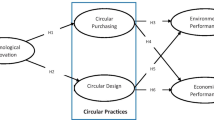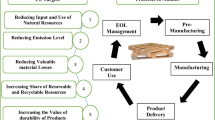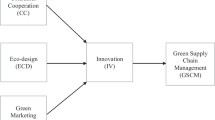Abstract
From the perspective of sustainable supply chain management (SSCM), this research looks at the key elements influencing how small- and medium-sized companies (SMEs) move toward a circular economy (CE). This research aims to understand the elements that influence SMEs to embrace CE principles and determine the real-world applications of SSCM practices. This research gathered and analyzed data from diverse European SMEs working inside CE networks using a mixed-method approach. We received answers from several of these firms using a survey form sent and emailed to them. The replies were then assessed using an independent t test to account for any biases. We used confirmatory factor analysis (CFA) for the validity assessment, compound consistency, and corrected-item-total association measures to validate the model’s validity and reliability. According to our research, SMEs are influenced significantly by societal pressures, green economic incentives, and environmental dedication when deciding whether to adopt CE practices. Our study further emphasizes the importance of SSCM for SMEs’ successful transition to a CE model, especially regarding resource and waste management efficiency. This work contributes to the corpus of research on the topic by providing empirical support for the function of SSCM in easing the transition towards CE in the setting of SMEs. The results might serve as a reference for managers and policymakers as they create plans to encourage SMEs to embrace CE practices and to emphasize the advantages of such a change on the economic, social, and environmental fronts. Putting a particular emphasis on the vital roles that public pressure, green financial incentives, and ecological dedication play, this research provides insights into the complex interactions between SSCM and CE transition in SMEs. Further study is needed to examine how these determinants could fluctuate across various industries and geographies.
Similar content being viewed by others
Data availability
The data can be available on request.
References
Adhikari B, King J, Vadlamannati KC, Chachu DO (2023) Why do some natural resource-rich countries adopt prudent fiscal rules? An empirical analysis. Ext Ind Soc 14:101234
Agliardi E, Agliardi R (2019) Financing environmentally-sustainable projects with green bonds. Environ Dev Econ 24(6):608–623
Al-Sulaiti KI, Baker MJ, Bryman A, Baker MJ, Ballington L, Bilkey WJ, Nes E, Bryman A, Bell E, Chen C, Gurhan-canli Z, Maheswaran D, Han CM, Terpstra V, Thyer BA, Gorey KM, Daly C, Richter NL, Gleason DR, … Saunders MNKK (2010) Research methods for business students. Int Mark Rev 14(2):656
Apergis N, Garćıa C (2019) Environmentalism in the EU-28 context: the impact of governance quality on environmental energy efficiency. Environ Sci Pollut Res 26(36):37012–37025
Arvola A, Vassallo M, Dean M, Lampila P, Saba A, Lähteenmäki L, Shepherd R (2008) Predicting intentions to purchase organic food: the role of affective and moral attitudes in the Theory of Planned Behaviour. Appetite 50(2–3):443–454
Atahau ADR, Sakti IM, Huruta AD, Kim M-S (2021) Gender and renewable energy integration: the mediating role of green-microfinance. J Clean Prod 318:128536
Becker TE, Atinc G, Breaugh JA, Carlson KD, Edwards JR, Spector PE (2016) Statistical control in correlational studies: 10 essential recommendations for organizational researchers. J Organ Behav 37(2):157–167
Boyle WA (2008) Partial migration in birds: tests of three hypotheses in a tropical lekking frugivore. J Anim Ecol 77(6):1122–1128
Bracking S (2015) Performativity in the Green Economy: how far does climate finance create a fictive economy? Third World Quarterly 36(12):2337–2357
Cao XH, Kannaiah D, Ye L, Khan J, Shabbir MS, Bilal K, Tabash MI (2022a) Does sustainable environmental agenda matter in the era of globalization? The relationship among financial development, energy consumption, and sustainable environmental-economic growth. Environ Sci Pollut Res 29(21):30808–30818
Cao XH, Kannaiah D, Ye L, Khan J, Shabbir MS, Bilal K, Tabash MI (2022b) Does sustainable environmental agenda matter in the era of globalization? The relationship among financial development, energy consumption, and sustainable environmental-economic growth. Environ Sci Pollut Res 1:1–11
Carraro C, Favero A, Massetti E (2012) Investments and public finance in a green, low carbon, economy. Energy Econ 34:S15–S28
Chen Z, Zhang Y, Wang H, Ouyang X, Xie Y (2022) Can green credit policy promote low-carbon technology innovation? J Clean Prod 359:132061
Chen R, Ramzan M, Hafeez M, Ullah S (2023) Green innovation-green growth nexus in BRICS: does financial globalization matter? J Innov Knowl 8(1):100286
Chen W, Wang B, Chen Y, Zhang J, Xiao Y (2023) New exploration of creativity: cross-validation analysis of the factors influencing multiteam digital creativity in the transition phase. Front Psychol 14. https://doi.org/10.3389/fpsyg.2023.1102085
Chien F, Ananzeh M, Mirza F, Bakar A, Vu HM, Ngo TQ (2021) The effects of green growth, environmental-related tax, and eco-innovation towards carbon neutrality target in the US economy. J Environ Manage 299:113633
Ciocoiu CN (2011) Integrating digital economy and green economy: opportunities for sustainable development. Theor Empir Res Urban Manag 6(1):33–43
Clark CE, DuPont B (2018) Reliability-based design optimization in offshore renewable energy systems. Renew Sustain Energy Rev 97:390–400
Cossu M, Yano A, Solinas S, Deligios PA, Tiloca MT, Cossu A, Ledda L (2020) Agricultural sustainability estimation of the European photovoltaic greenhouses. Eur J Agron 118:126074
Danish, Ulucak R, Baloch MA (2023) An empirical approach to the nexus between natural resources and environmental pollution: do economic policy and environmental-related technologies make any difference? Resour Policy 81:103361
Dinda S (2004) Environmental Kuznets curve hypothesis: a survey. Ecol Econ 49(4):431–455. https://doi.org/10.1016/j.ecolecon.2004.02.011
Ding K, Choo WC, Ng KY, Zhang Q (2023) Exploring changes in guest preferences for Airbnb accommodation with different levels of sharing and prices: using structural topic model. Front Psychol 14:1120845. https://doi.org/10.3389/fpsyg.2023.1120845
Dong JF, Wang Q, Deng C, Wang XM, Zhang XL (2016) How to move china toward a green-energy economy: from a sector perspective. Sustainability (Switzerland) 8(4):337
Falcone PM, Morone P, Sica E (2018) Greening of the financial system and fuelling a sustainability transition: a discursive approach to assess landscape pressures on the Italian financial system. Technol Forecast Soc Chang 127:23–37
Feng S, Chong Y, Yu H, Ye X, Li G (2022) Digital financial development and ecological footprint: evidence from green-biased technology innovation and environmental inclusion. J Cleaner Prod 380:135069
Gao H, Hsu P, Li K, Zhang J (2020) The real effect of smoking bans: evidence from corporate innovation. J Financ Quant Anal 55(2):387–427. https://doi.org/10.1017/S0022109018001564
Gao H, Shi D, Zhao B (2021) Does good luck make people overconfident? Evidence from a natural experiment in the stock market. J Corp Fin (Amsterdam, Netherlands) 68:101933. https://doi.org/10.1016/j.jcorpfin.2021.101933
Ge P, Liu T, Huang X (2023) The effects and drivers of green financial reform in promoting environmentally-biased technological progress. J Environ Manag 339:117915
Graça J, Oliveira A, Calheiros MM (2015) Meat, beyond the plate. Data-driven hypotheses for understanding consumer willingness to adopt a more plant-based diet. Appetite 90:80–90
Government, W. G. H. S (2022) Organizational design: An overview and a primer research for those of PPPs in the developing countries. J Chin Hum Resour Manag 13(2):65–75. https://doi.org/10.47297/wspchrmWSP2040-800506.20221302
Guo B, Wang Y, Feng Y, Liang C, Tang L, Yao X, Hu F (2022) The effects of environmental tax reform on urban air pollution: a quasi-natural experiment based on the environmental protection tax law. Front Public Health 10:967524. https://doi.org/10.3389/fpubh.2022.967524
Hong M, Li Z, Drakeford B (2021) Do the green credit guidelines affect corporate green technology innovation? Empirical research from China. Int J Environ Res Public Health 18(4):1–21
Huang X, Huang S, Shui A (2021) Government spending and intergenerational income mobility: evidence from China. J Econ Behav Organ 191:387–414. https://doi.org/10.1016/j.jebo.2021.09.005
Kark S, Sol D (2005) Establishment success across convergent Mediterranean ecosystems: an analysis of bird introductions. Conserv Biol 19(5):1519–1527
Khan MK, Babar SF, Oryani B, Dagar V, Rehman A, Zakari A, Khan MO (2022) Role of financial development, environmental-related technologies, research and development, energy intensity, natural resource depletion, and temperature in sustainable environment in Canada. Environ Sci Pollut Res 29(1):622–638
Kitzes J (2013) An introduction to environmentally-extended input-output analysis. Resources 2(4):489–503
Kneip A, Simar L, Wilson PW (2016) Testing hypotheses in nonparametric models of production. J Bus Econ Stat 34(3):435–456
Lee Y (2011) Understanding anti-plagiarism software adoption: an extended protection motivation theory perspective. Decis Support Syst 50(2):361–369
Li J, Yang X, Shi V, Cai GG (2023) Partial centralization in a durable-good supply chain. Prod Oper Manag 32(9):2775–2787. https://doi.org/10.1111/poms.14006
Li Q, Lin H, Tan X, Du S (2020) H∞ consensus for multiagent-based supply chain systems under switching topology and uncertain demands. IEEE Trans Syst Man Cybern Syst 50(12):4905–4918. https://doi.org/10.1109/TSMC.2018.2884510
Li X, Sun Y (2020) Stock intelligent investment strategy based on support vector machine parameter optimization algorithm. Neural Comput & Applic 32(6):1765–1775. https://doi.org/10.1007/s00521-019-04566-2
Li X, Yang X, Wei Q, Zhang B (2019) Authoritarian environmentalism and environmental policy implementation in China. Resour Conserv Recycl 145:86–93
Li Z, Zhou X, Huang S (2021) Managing skill certification in online outsourcing platforms: a perspective of buyer-determined reverse auctions. Int J Prod Econ 238:108166. https://doi.org/10.1016/j.ijpe.2021.108166
Lin T, Du M, Ren S (2022) How do green bonds affect green technology innovation? Firm evidence from China. Green Finance 4(4):492–511
Lorek S, Spangenberg JH (2014) Sustainable consumption within a sustainable economy–beyond green growth and green economies. J Clean Prod 63:33–44
Luo J, Zhuo W, Xu B (2023) The bigger, the better? Optimal NGO size of human resources and governance quality of entrepreneurship in circular economy. Manag Decis. https://doi.org/10.1108/MD-03-2023-0325
Milfont TL, Bain PG, Kashima Y, Corral-Verdugo V, Pasquali C, Johansson LO, Guan Y, Gouveia VV, Garðarsdóttir RB, Doron G, Bilewicz M, Utsugi A, Aragones JI, Steg L, Soland M, Park J, Otto S, Demarque C, Wagner C, … Einarsdóttir G (2018) On the relation between social dominance orientation and environmentalism: a 25-nation study. Soc Psychol Personal Sci 9(7):802–814
Musova Z, Musa H, Matiova V (2021) Environmentally responsible behaviour of consumers: evidence from Slovakia. Econ Sociol 14(1):178–198
Pang PC, Haslam SM, Dell A, Clark GF (2016) The human fetoembryonic defense system hypothesis: twenty years on. Mol Aspects Med 51:71–88
Qu K, Liu Z (2022) Green innovations, supply chain integration and green information system: a model of moderation. J Clean Prod 339:130557
Ramzan M, Ullah S, Raza SA, Nadeem M (2023) A step towards achieving SDG 2030 agenda: analyzing the predictive power of information globalization amidst technological innovation-environmental stewardship nexus in the greenest economies. J Environ Manag 335:117541
Ren X, Xia X, Taghizadeh-Hesary F (2023) Uncertainty of uncertainty and corporate green innovation—evidence from China. Econ Anal Policy 78:634–647
Rubio-Andrés M, Ramos-González M del M, Sastre-Castillo MÁ, Gutiérrez-Broncano S (2023) Stakeholder pressure and innovation capacity of SMEs in the COVID-19 pandemic: mediating and multigroup analysis. Technol Forecast Soc Change 190:122432
Russel T (2017) Greener purchasing: Opportunities and innovations. Routledge, London
Samusevych Y, Vysochyna A, Vasylieva T, Lyeonov S, Pokhylko S (2021) Environmental, energy and economic security: ASSESSMENT and interaction. E3S Web Conf 234:00012
Sarangi U (2019) Green economy, environment and international trade for global sustainable development. J Int Econ 10(2):44–60
Song W, Yu H (2018) Green innovation strategy and green innovation: the roles of green creativity and green organizational identity. Corp Soc Responsib Environ Manag 25(2):135–150
Suki NM, Suki NM, Sharif A, Afshan S, Rexhepi G (2022) Importance of green innovation for business sustainability: identifying the key role of green intellectual capital and green SCM. Bus Strateg Environ
Sun X, Zhang A, Zhu M (2023) Impact of Pilot Zones for Green Finance Reform and Innovations on green technology innovations: evidence from Chinese manufacturing corporates. Environ Sci Pollut Res 30(15):43901–43913
Tratalos J, Fuller RA, Evans KL, Davies RG, Newson SE, Greenwood JJD, Gaston KJ (2007) Bird densities are associated with household densities. Glob Change Biol 13(8):1685–1695. https://doi.org/10.1111/J.1365-2486.2007.01390.X
Uche E, Das N, Bera P, Cifuentes-Faura J (2023) Understanding the imperativeness of environmental-related technological innovations in the FDI—environmental performance nexus. Renew Energy 206:285–294
Valdebenito MA, Schuëller GI (2010) A survey on approaches for reliability-based optimization. Struct Multidiscip Optim 42(5):645–663
Wang H, Zhang X, Jiang S (2022b) A laboratory and field universal estimation method for Tire–pavement interaction noise (TPIN) based on 3D image technology. Sustainability 14(19). https://doi.org/10.3390/su141912066
Wang K, Tao S (2023) Why do Chinese private enterprises seek outward foreign direct investment? China World Econ 31(4):200–218. https://doi.org/10.1111/cwe.12497
Wang Y, Han X, Jin S (2022a) MAP based modeling method and performance study of a task offloading scheme with time-correlated traffic and VM repair in MEC systems. Wirel Netw. https://doi.org/10.1007/s11276-022-03099-2
Wang Z, Tang K (2020) Reorientation of collective negotiation in Chinese enterprises amid an uncertain context. J Chin Hum Resour Manag 11(1):22–33. https://doi.org/10.47297/wspchrmWSP2040-800502.20201101
Wardhaugh CW (2014) The spatial and temporal distributions of arthropods in forest canopies: uniting disparate patterns with hypotheses for specialisation. Biol Rev 89(4):1021–1041
Wu H, Jin S, Yue W (2022) Pricing policy for a dynamic Spectrum allocation scheme with batch requests and impatient packets in cognitive radio networks. J Syst Sci Syst Eng 31(2):133–149. https://doi.org/10.1007/s11518-022-5521-0
Xie X, Huo J, Zou H (2019) Green process innovation, green product innovation, and corporate financial performance: a content analysis method. J Bus Res 101:697–706
Xu X, Lin Z, Li X, Shang C, Shen Q (2022) Multi-objective robust optimisation model for MDVRPLS in refined oil distribution. Int J Prod Res 60(22):6772–6792. https://doi.org/10.1080/00207543.2021.1887534
Xu Y, Chen H, Wang Z, Yin J, Shen Q, Wang D, Hu X (2023) Multi-factor sequential re-ranking with perception-aware diversification. In: Paper presented at the KDD '23, New York. https://doi.org/10.1145/3580305.3599869
Yan L, Yin-He S, Qian Y, Zhi-Yu S, Chun-Zi W, Zi-Yun L (2021) Method of reaching consensus on probability of food safety based on the integration of finite credible data on block chain. IEEE Access 9:123764–123776. https://doi.org/10.1109/ACCESS.2021.3108178
Yang Y, Su X, Yao S (2022) Can green finance promote green innovation? The moderating effect of environmental regulation. Environ Sci Pollut Res 29(49):74540–74553
Yong JY, Yusliza MY, Ramayah T, Seles BMRP (2022) Testing the stakeholder pressure, relative advantage, top management commitment and green human resource management linkage. Corp Soc Responsib Environ Manag 29(5):1283–1299
Yue H, Li T, Li F (2021) Analysis of the functional manifestation of plant landscape management on urban roads. ACM International Conference Proceeding Series, 968–971
Zhang Y, Li X (2022) The impact of the green finance reform and innovation pilot zone on the green innovation—evidence from China. Int J Environ Res Public Health 19(12):7330
Zhao M, Zhou Y, Li X, Cheng W, Zhou C, Ma T, Huang K (2020) Mapping urban dynamics (1992–2018) in Southeast Asia using consistent nighttime light data from DMSP and VIIRS. Remote Sens Environ 248:111980. https://doi.org/10.1016/j.rse.2020.111980
Zhao S, Zhang L, An H, Peng L, Zhou H, Hu F (2023) Has China's low-carbon strategy pushed forward the digital transformation of manufacturing enterprises? Evidence from the low-carbon city pilot policy. Environ Impact Assess Rev 102:107184. https://doi.org/10.1016/j.eiar.2023.107184
Zhong S, Pantelous AA, Goh M, Zhou J (2019) A reliability-and-cost-based fuzzy approach to optimize preventive maintenance scheduling for offshore wind farms. Mech Syst Signal Process 124:643–663
Zhou SY, Chen H, Li SC (2010) Resources use and greenhouse gas emissions in urban economy: ecological input-output modeling for Beijing 2002. Commun Nonlinear Sci Numer Simul 15(10):3201–3231
Zhu Q, Geng Y, Lai KH (2010) Circular economy practices among Chinese manufacturers varying in environmental-oriented supply chain cooperation and the performance implications. J Environ Manag 91(6):1324–1331
Author information
Authors and Affiliations
Contributions
He Zhu: conceptualization, data curation, methodology, writing—original draft, data curation, visualization, supervision, editing, writing—review and editing, and software.
Corresponding author
Ethics declarations
Ethics approval and consent to participate
The authors declare that they have no known competing financial interests or personal relationships that seem to affect the work reported in this article. We declare that we have no human participants, human data or human tissues.
Consent for publication
N/A.
Conflict of interest
The authors declare no competing interests.
Additional information
Responsible Editor: Arshian Sharif
Publisher's Note
Springer Nature remains neutral with regard to jurisdictional claims in published maps and institutional affiliations.
Rights and permissions
Springer Nature or its licensor (e.g. a society or other partner) holds exclusive rights to this article under a publishing agreement with the author(s) or other rightsholder(s); author self-archiving of the accepted manuscript version of this article is solely governed by the terms of such publishing agreement and applicable law.
About this article
Cite this article
Zhu, H. The role of digital transformation in supply chain efficiency and economic output. Environ Sci Pollut Res 31, 3656–3668 (2024). https://doi.org/10.1007/s11356-023-30984-w
Received:
Accepted:
Published:
Issue Date:
DOI: https://doi.org/10.1007/s11356-023-30984-w




